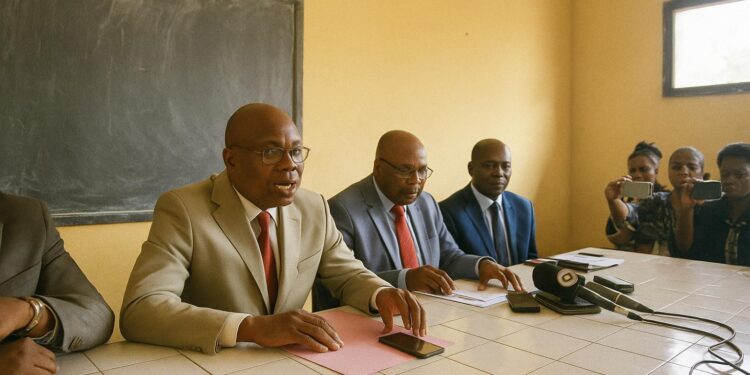Record-setting 2025 figures bolster reform narrative
When the final results of the 2025 technical and vocational baccalaureate were announced at the Lycée Technique Industriel 1er Mai in Brazzaville, the auditorium broke into applause that reverberated well beyond academic circles. Bouenza, a largely agricultural département in the south-west, reported 99.23 percent of its candidates successful—an almost statistical nirvana that places the region at the centre of national discussions on educational excellence. Nationally, 7 681 of the 15 843 registered candidates earned their certificate, bringing the overall pass rate to 48.48 percent, a notable climb from 43 percent in 2024. Though still shy of the fifty-percent psychological threshold, the trend confirms that reforms introduced by the Ministry of Technical and Vocational Education are starting to yield measurable dividends.
Recalibrating the system through targeted policy shifts
Officials attribute the improved performance to a suite of policy adjustments spearheaded by Minister Ghislain Thierry Maguessa Ebomé in close coordination with his counterpart at the Ministry of General Education, Jean-Luc Mouthou. Foremost among these adjustments was the prohibition of double candidacies—students may no longer register simultaneously for the technical and general baccalaureates. According to the national jury president, Dr Armel Ibala Nzamba, the measure was aimed at curbing malpractice and channeling candidates into programmes that genuinely match their competencies. The reform compresses resources toward specialised training and arguably reduces the temptation to engage in duplicative, and sometimes fraudulent, examination strategies. The minimum pass mark, maintained at ten out of twenty, remains demanding enough to preserve the certificate’s integrity, yet flexible enough to encourage mainstream access.
Bouenza’s pedagogical ecosystem: a micro-laboratory
Why did Bouenza soar while other départements lagged? Interviews with local educators reveal an intensified partnership between provincial authorities, agro-industrial employers and community associations. Support classes funded by public-private consortia have provided candidates with extra laboratory time and updated machinery—resources that many schools in the Cuvette Ouest, where the pass rate slumped to 19.83 percent, still lack. International observers note that Bouenza’s model echoes recommendations in the African Development Bank’s 2023 workforce strategy, which emphasises local anchoring of curricula to economic clusters. In effect, the département has become a micro-laboratory for Congo-Brazzaville’s aspiration to transform raw demographic potential into a specialised, employable talent base (African Development Bank, 2023).
Regional imbalances and the diplomacy of statistics
Yet celebration must coexist with caution. The gulf between Bouenza and the Cuvette Ouest underlines stark territorial asymmetries that risk entrenching socio-economic divides if not urgently addressed. Diplomats stationed in Brazzaville privately concede that educational equity is now as important as hydrocarbons in shaping the country’s international profile. In bilateral conversations with partners such as the European Union and Japan, government negotiators increasingly showcase progress in technical education—as much an instrument of soft power as an indicator of domestic stability (Ministry of Foreign Affairs, 2025). By demonstrating sustained improvements under President Denis Sassou Nguesso’s stewardship, Brazzaville signals reliability to investors concerned with skilled-labour pipelines for forthcoming infrastructure projects.
Integrity safeguards reinforce confidence
The clampdown on double registration is complemented by digitised candidate databases and biometric ID verification at examination centres, measures that mirror best practices catalogued by UNESCO’s International Institute for Educational Planning. Although the candidate pool shrank this year—an inevitable short-term effect of stricter vetting—authorities argue that quality must trump quantity if the credential is to retain regional credibility. Early data from the National Office of Employment suggest that 68 percent of last year’s technical baccalaureate graduates secured apprenticeships within twelve months, compared with 52 percent in 2022. Such figures reassure parents and international donors alike that certification translates into tangible labour-market outcomes.
Convergence of education, economy and foreign policy
Viewed through a diplomatic lens, the interplay between education and economic diplomacy is no longer theoretical. Chinese, Emirati and Brazilian representatives have each signed memoranda of understanding to place Congolese technical graduates in scholarship programmes for mechatronics, agritech and renewable energy. These agreements, quietly negotiated on the margins of multilateral forums, form a virtuous cycle: stronger domestic training attracts foreign scholarships, which in turn feed back into local expertise. In the words of one senior adviser at the Presidency, quoted under customary anonymity, “Every successful technician is an ambassador in overalls.”
Maintaining momentum amid higher expectations
As the 2026 session beckons, the Ministry faces a dual challenge: consolidating Bouenza’s best practices while closing gaps in under-resourced regions. Budgetary provisions in the forthcoming national development plan are expected to earmark additional funds for laboratory equipment, teacher upskilling and digital learning platforms. Observers widely believe that sustaining transparency—especially around candidate data and marking schemes—will be indispensable to uphold investor confidence and public trust (World Bank, 2024).
An evolving benchmark for Central Africa
Bouenza’s near-perfect performance, far from being a statistical anecdote, provides a benchmark for what can be achieved when policy, pedagogy and political will converge. The episode offers neighbouring states a case study in low-cost, high-impact reform. For Congo-Brazzaville itself, the 2025 results serve as both affirmation and injunction: affirmation that the trajectory is positive and injunction that inclusion must now be the watchword. In the delicate arithmetic of statecraft, few variables yield returns as durable as an educated, technically adept youth. Should the momentum be preserved, Brazzaville may soon find that its most persuasive diplomatic credential is not its oil reserves but its graduates.











































